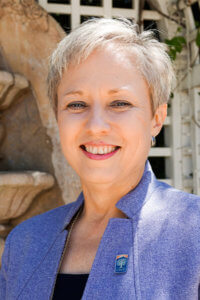
College of Health and Human Development
Dean Laurie Roades
Integrity, collaboration and insight. As Laurie Roades has climbed the ranks in higher education, these qualities have become hallmarks of her leadership style. Roades, a professor of psychology, has served as dean of the College of Health and Human Development for the past five years and has more than 25 years of service in the California State University system. Roades holds a doctorate in clinical psychology from the University of Missouri-St. Louis.
Her work at Cal State Fullerton — made possible with many, she is quick to point out — includes facilitating and developing a new strategic plan; honing in on student success and preparation for post-graduate success; enhancing the college’s focus on diversity, equity and inclusion; launching new programs to support faculty and student scholarly accomplishments; and increasing philanthropic support for college programs.
What is your college doing to advance women to become leaders in the fields of health and human development?
The College of Health and Human Development offers incredibly strong programs at the bachelor’s, master’s and doctoral levels that include not only academic preparation, but also experiential learning through internships, practicums and community placements. As a result, our students are preparing not just to work, but also to lead, within their fields. In addition, the college has had many female faculty, chairs, directors and administrators over the years, with many also serving as leaders within the community and their professional organizations. These women serve as significant role models and mentors for our female students and encourage them to begin seeing themselves as leaders, both while they are on campus and as they progress in their careers.
What is one example of an obstacle you personally encountered — and overcame?
I have been fortunate to have had strong female mentors and role models throughout my education and my professional career. However, I think that one challenge women often encounter is wondering whether or not they are qualified enough or prepared enough or will ever just be considered “enough” when they think about new opportunities or possible leadership positions, and I have certainly experienced that at times over the years. It was very helpful when I came to understand that no one can ever be “fully” prepared until they’ve actually served in a role and that, if you’ve done your homework, developed your skills and gained appropriate experience, you are probably as ready as you will ever be and as ready as anyone else might be. This helped me to confront those lingering doubts and insecurities and move forward. I think the question we, as women, need to ask more frequently is, “Why not me?”
What advice do you have for female students in your college?
Some of the best advice I received from my mentor, an amazing female faculty member, when I was an undergraduate student was “Don’t ever let anyone make you feel embarrassed or ashamed about what you don’t know. There was a time they didn’t know some things either, and you are here so that you can learn. If you already knew everything, you wouldn’t need to be here. If someone tries to shame you, it’s more about them than about you. Keep asking questions and keep knocking on doors until you get to someone who will listen and who will help guide you to where you want to go.” I want our students to know this, as well as the following: You can do this! You are going to have to work hard to be successful; most of us do. But you don’t have to do it alone. We’re here to help, and the only reason most of us are in the positions we’re in is because someone helped us along the way.